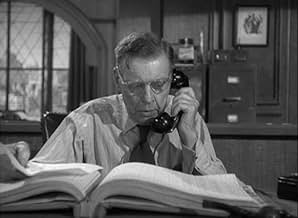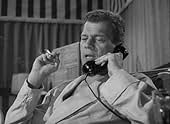Breakdown
- Episode aired Nov 13, 1955
- TV-14
- 26m
William Callew is involved in a bad traffic accident on a rural road, that leaves him so paralyzed he appears lifeless, and when help arrives they think he's really dead.William Callew is involved in a bad traffic accident on a rural road, that leaves him so paralyzed he appears lifeless, and when help arrives they think he's really dead.William Callew is involved in a bad traffic accident on a rural road, that leaves him so paralyzed he appears lifeless, and when help arrives they think he's really dead.
- Director
- Writers
- Stars
- Guard
- (as Jim Weldon)
- Director
- Writers
- All cast & crew
- Production, box office & more at IMDbPro
Featured reviews
"Imagine, if you can, the terror of being inside a television set"
Joseph Cotten plays William Callew, a callous businessman with little regard for human emotion. After a long-time employee weeps uncontrollably after losing his job, Callew unsympathetically condemns his lack of self-control. However, poetic justice is about to ensue. After becoming involved in a ghastly car collision with a truck of chain-gang prisoners, Callew wakes up paralysed from head to toe, but conscious enough to thinking logically. The fleeing prisoners offer hope of rescue, but instead believing him to be dead seize the opportunity to loot his clothing. Despite regaining slight movement in a single finger, nobody seems to recognise that Callew is still alive, and he seems destined to be buried that way. Hitchcock uses point-of-view shots to powerful effect, and Cotten though not called upon to do much in the way of acting delivers a creepy monotone voice-over that communicates his overwhelming paranoia. Though a lesson is proposed by the conclusion, its presence seems to be tongue-in-cheek, with Hitchcock spelling out the necessity of a "moral" in his introduction.
a major short work from this director
How it finally gets resolved is kind of touching, if, for some, may seem kind of sappy. But Cotten really sells it with his voice and even his face and eyes, frozen as they are, because of how his character is set up and the follow-up happens. This is the kind of material that the Twilight Zone would go for years later, and I mean that as a compliment. It's among Hitch's best work in the 50's, for TV or film.
A grisly and disturbing episode....perhaps the most of the era!
When the story begins, you see that Willam Callew (Joseph Cotten) is a rich but very hard man. He's humorless and when he has an older employee fired, he complains to his friend that the man should essentially take it and stop whining...and not be so emotional.
A bit later, Callew is driving home and a horrible accident occurs. Many folks are killed and he's completely paralyzed from head to toe. He cannot talk nor close his eyes and by all appearances he is dead. But he is alive and you hear Callew's voice as he talks to himself. This continues for about 80% of the episode...and when they wheel him into the morgue, it's quite disturbing! Does he stand a chance of anyone noticing that he isn't dead....just very, very badly injured.
This is well made...no doubt about it. But it's also very disturbing and something that some might just want to pass on because of it.
Even ruthless businessmen break down...
The beginning of the whole story has got a special meaning: a heartless businessman on holiday has just given one of his oldest employees the sack without any warning, and the desperate man calls him on the phone, begging him and crying - and yet, all he does is make fun of his 'childish' behavior, remarking that there was no need for him to cry like a baby... BUT a little while later, he finds himself in a VERY desperate situation as well: after an accident, he's stuck behind the wheel of his luxury limousine, looking like he was dead - and he can't move, he can't talk, he can't give a sign of life; and so they take him to the morgue...
This has DEFINITELY got a touch of Edgar Allan Poe, and it's REALLY chilling to 'live' those dreadful hours (even 'crammed' into a 30-minute TV episode); but it also contains a PRETTY clear social and moral lesson... Joseph Cotten is simply EXCELLENT in a quite unusual role; and Hitch's directing is, to say the least, more breathtaking than in many of his most famous movies!
I'm alive!
Did you know
- TriviaThis won Edward W. Williams the 1956 Primetime Emmy for Best Editing of a Television Film.
- GoofsWhen watching current film-transferred versions on a modern definition television, one can see William Callew (Joseph Cotton) blinking his eyes even though it was established earlier that he could not move anything, including his eyelids. This is especially noticeable when the two escaped convicts are moving his body and disrobing him in the car. This would not have been noticeable at the time of first broadcast due to the poor resolution of the televisions.
- Quotes
[last lines]
Alfred Hitchcock: Well, that was a bit of a near thing. He reminded me of my own situation. Imagine, if you can, the terror of being inside a television set, knowing that any moment, the viewer may shut you off, and being powerless to prevent it. And I go through this every week. My only consolation is that some portions of our program are so fascinating, that they hold the viewer spellbound. Such an episode follows immediately. And then I'll be back again.
[commercial break]
Alfred Hitchcock: There, now, that really held you in suspense, didn't it? For more of the same, I recommend you tune in next week at this time. I shall see you, then. Bonsoir.
- ConnectionsFeatured in Nightmares & Dreamscapes: From the Stories of Stephen King (2006)
- SoundtracksFuneral March of a Marionette
Written by Charles Gounod
Details
- Runtime
- 26m
- Color
- Aspect ratio
- 1.33 : 1






















